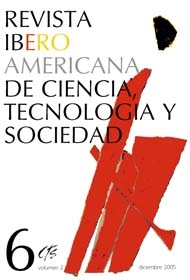Public Participation in Technological Systems
Lessons for STS Education
DOI:
https://doi.org/10.52712/issn.1850-0013-998Keywords:
technological system, public participation, technological education, STS educationAbstract
Learning to participate has become increasingly crucial in today’s scientific education and contemporary technology. This article discloses some of the results of a research study which promotes such participation by means of different teaching techniques/approaches. Conceptual aspects as well as the public participation at an international level have also been revised to extract elements that will allow the development of learning strategies of public participation in issues related to science and technology. These learning strategies have been suggested taking the concept of technological system as the unit of analysis . It is possible to learn to participate through the notion of technological system. The proposed didactics are: focal groups, mediation, simulated cases, and the cycle of responsibility; all of which are to be considered in relation to the public participation in matters related to drinking water, health, and agriculture in the Colombian context.
Downloads
References
BAUGHMAN, Mike (1995): “Mediation”, en Renn, O; Webler, Th; Wiedemann, P. Fairness and competence in citizen participation, Dordrecht, Kluwer Academic Publishers.
CHECKLAND, P. (1981): Systems thinking, systems practice, London, John Wiley & Sons.
GONZÁLEZ, Marta; LÓPEZ CEREZO, José Antonio; LUJÁN, José Luis (1996):
Ciencia, tecnología y sociedad: Una introducción al estudio social de la ciencia y la tecnología, Madrid, Tecnos.
HUGHES, Thomas (1994): “El impulso tecnológico”, en Roe Smith, M. y Marx, L.(eds.) Historia y determinismo tecnológico, Madrid, Alianza Editorial.
HUGHES, Thomas (1987): “The evolution of large technological systems”, en Bijker, W. E; Hughes, Thomas P; Pinch, Tr e v o r. (eds.) The social construction of technological systems. New directions in the sociology and history of technology, Cambridge, MA, MIT Press.
HUGHES, Thomas (1983): Networks of power: Electrification in western society, 1880-1930, Baltimore, Johns Hopkins University Press.
LÓPEZ CEREZO, J. A. y GONZÁLEZ GARCÍA, M. I. (2002): Políticas del bosque, Madrid, Cambridge University Press/OEI.
MANASSERO, M. A.; VÁZQUEZ, Á.; ACEVEDO, J. A. (2001): Avaluació dels temes de ciència, tecnologia i societat, Palma de Mallorca, Conselleria d’Educació i Cultura del Govern de les Illes Ballears.
GORDILLO, Martín; LÓPEZ CEREZO, J. A.; OSORIO, C. (2000): “La educación en valores a través de CTS”, Foro Iberoamericano de Educación en Valores, Uruguay, octubre.
NELKIN, D. (1984): “Science and technology policy and the democratic process”, en Petersen, J. C. (ed.) Citizen participation in science policy, Amherst, University of Massachusetts Press.
QUINTANILLA, M. A. (1988): Tecnología: Un enfoque filosófico, Madrid: Fundesco.
QUINTANILLA, M. A. (1998): “Técnica y cultura”, en J.A. Lopéz Cerezo et al. (eds.) Filosofía de la tecnología, Madrid, OEI.
QUIROGA, E.; VISSCHER, J. T. (eds.) (1997): Transferencia de tecnología en el sector de agua y saneamiento en Colombia. Una experiencia de aprendizaje, Santiago de Cali, Universidad del Valle, International Water and Sanitation Centre (IRC).
RENN, O; WEBLER, T.; WIEDEMANN, P. (1995): Fairness and competence in citizen participation, Dordrecht, Kluwer Academic Publishers.
ROWE, G.; FREWER, L. (2000): “Public participation methods: A framework for evaluation”, Science, Technology and Human Values, 25, 1, pp. 3-29.
SCHIENSTOCK, G. (1994): “Technology policy in the process of change. Changing paradigms in research and technology policy”, en Aichholzer, G y Schienstock, G.(eds.) Technology policy: Towards and integration of social and ecological concerns, Berlin-Nueva York, De Gruyter.
VELÁSQUEZ, Fabio E.; GONZÁLEZ, Esperanza. (1994): “Gestión de servicios públicos y participación en Colombia”, en Participación comunitaria y servicios públicos, Memorias Seminario Internacional Participación Comunitaria y Servicios Públicos , Cali, Asociación Colombiana de Ingeniería Sanitaria y Ambiental (ACODAL), noviembre.
WAKS, L. (1996): “Filosofía de la educación en CTS. Ciclo de responsabilidad y trabajo comunitario”, en A. Alonso et al. Para comprender ciencia, tecnología y sociedad, Pamplona, Verbo Divino.
WYNNE, B. (1.983): “Redefining the issues of risk and public acceptance” Futures, Febrero, 13, 32.
Downloads
Published
How to Cite
Issue
Section
License
Copyright (c) 2025 CC Attribution 4.0

This work is licensed under a Creative Commons Attribution 4.0 International License.
All CTS's issues and academic articles are under a CC-BY license.
Since 2007, CTS has provided open and free access to all its contents, including the complete archive of its quarterly edition and the different products presented in its electronic platform. This decision is based on the belief that offering free access to published materials helps to build a greater and better exchange of knowledge.
In turn, for the quarterly edition, CTS allows institutional and thematic repositories, as well as personal web pages, to self-archive articles in their post-print or editorial version, immediately after the publication of the final version of each issue and under the condition that a link to the original source will be incorporated into the self-archive.











